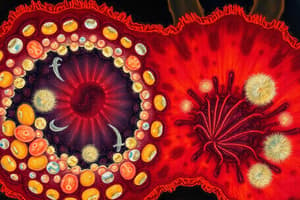Podcast
Questions and Answers
Match the following organelles with their functions:
Match the following organelles with their functions:
Mitochondria = Breaks down food to make energy Endoplasmic Reticulum = The internal delivery system of the cell, it makes lipids and packages the proteins to be released from the cell Chloroplast = Organelles found in plant cells, photosynthesis happens here Golgi bodies (complex) = Processes and transports proteins and materials from the endoplasmic reticulum into and out of the cell by forming a bubble/ vesicle
Match the following cell components with their descriptions:
Match the following cell components with their descriptions:
Cell Wall = Surrounds plant cell, enables the plant to stand straight Ribosomes = Proteins are made here, every cell needs proteins to live Nucleus = Controls the cell's activities and contains DNA Lysosomes = Mostly found in animal cells, digest food particles, gets rid of wastes and protects the cell from foreign invaders
Match the following cell structures with their functions:
Match the following cell structures with their functions:
Cell membrane = Allows certain materials to pass into the cell and out Vacuole = Large sacs in plant cells store water in plants and in animal cells they are smaller Rough endoplasmic reticulum = The part of the cell covered in ribosomes found near the nucleus, it delivers proteins throughout the cell ATP = A substance which stores the energy released by mitochondria
Match the following cell components with their primary functions:
Match the following cell components with their primary functions:
Match the following cell structures with their functions:
Match the following cell structures with their functions:
Match the following organelles with their functions:
Match the following organelles with their functions:
Match the following cell structures with their descriptions:
Match the following cell structures with their descriptions:
Match the following cell structures with their primary functions:
Match the following cell structures with their primary functions:
Flashcards are hidden until you start studying
Study Notes
Organelles and Their Functions
- Mitochondria: Powerhouse of the cell; generates ATP through cellular respiration.
- Ribosomes: Sites of protein synthesis, can be free-floating or attached to the endoplasmic reticulum.
- Lysosomes: Contain digestive enzymes to break down waste materials and cellular debris.
- Endoplasmic Reticulum (ER): Involved in protein and lipid synthesis; rough ER has ribosomes, smooth ER does not.
Cell Components and Their Descriptions
- Cell Membrane: Semi-permeable barrier that regulates the entry and exit of substances.
- Cytoplasm: Gel-like fluid that fills the cell; site for many metabolic processes.
- Nucleus: Control center of the cell; contains genetic material (DNA) and regulates cellular activities.
- Cytoskeleton: Network of protein filaments that provides structural support and aids in cell movement.
Cell Structures and Functions
- Cell Wall: Rigid outer layer found in plant cells; provides structure and protection.
- Chloroplasts: Organelles responsible for photosynthesis, converting sunlight into energy in plant cells.
- Golgi Apparatus: Processes and packages proteins and lipids for secretion or use within the cell.
Primary Functions of Cell Components
- Plasma Membrane: Maintains homeostasis by controlling the passage of ions and molecules in and out of the cell.
- Nucleolus: Produces ribosomal RNA (rRNA) and assembles ribosomes from proteins and rRNA.
- Peroxisomes: Contain enzymes for breaking down fatty acids and detoxifying harmful substances.
Additional Cell Structures
- Centrioles: Involved in cell division; help organize the spindle fibers.
- Vacuoles: Storage organelles primarily for water, nutrients, and waste products; larger in plant cells.
- Vesicles: Small membrane-bound sacs that transport materials within the cell.
Summary of Functions
- Organelle interactions maintain cellular health and function.
- An understanding of organelles aids in comprehending cellular processes and systems.
Studying That Suits You
Use AI to generate personalized quizzes and flashcards to suit your learning preferences.




